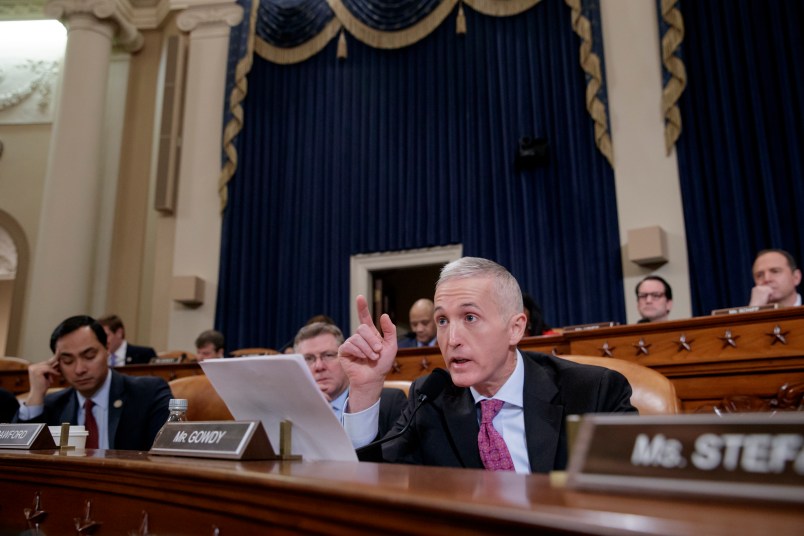Hours before the start of Monday’s long-awaited House Intelligence Committee hearing on Russia’s interference in the U.S. election, President Donald Trump sent a tweet saying the “real story” is “the leaking of Classified information” about his administration. Republicans on the committee were apparently on the same page.
The partisan divide in questioning was stark: an overwhelming number of the questions Republicans directed to FBI Director James Comey and NSA Director Mike Rogers focused on the national security risks and criminal consequences of leaking classified material to the press, while Democrats on the committee honed in on the explosive revelations that those leaks brought to light.
Over the course of the five-and-a-half-hour long hearing, Democrats surfaced the links between and Russian officials and Trump associates, Russia’s cyberattacks of U.S. systems, and Trump’s baseless allegation that he had his “wires tapped” by former President Barack Obama.
But Republicans barely touched on those subjects, staying laser-focused on leaks to the press—even suggesting, without evidence, that top Obama administration officials could be responsible for the leaks that led to the ouster of Trump’s first national security adviser.
Rep. Devin Nunes (R-CA), the committee chair, set the tone in his opening remarks, saying the hearing was intended in part to determine “who has leaked or facilitated leaks of classified information so these individuals can be brought to justice.”
One of the most significant discoveries to come from recent leaks was the multiple phone conversations about U.S. sanctions that former national security adviser Michael Flynn had with Russian ambassador Sergey Kislyak during the transition. Though Flynn’s misleading descriptions of those calls to the White House ultimately led to his ouster, GOP lawmakers on the committee seemed primarily concerned that those conversations were ever disclosed in the first place.
Reps. Tom Rooney (R-FL) and Trey Gowdy (R-SC) asked how the details of those calls were made public.
“I thought it was against the law to disseminate classified information,” Gowdy said. “Is it?”
Gowdy emphasized repeatedly that the unauthorized dissemination of classified information obtained under the Foreign Intelligence Service Act (FISA), which is believed to be the source for the Flynn call transcripts, is a “felony punishable by up to 10 years in prison.”
Later in the hearing, Gowdy rattled off the names of former officials in the Obama administration who may have known that Flynn was on the call, asking if they could have “unmasked” Flynn’s name to the press. He even asked if Obama was briefed on the matter, leaving open the possibility that the former President could have shared the classified information himself.
Gowdy refused to refer to Flynn by name to underline his point about the sensitivity of the information shared, calling him “a U.S. citizen.”
Incidentally, the South Carolina lawmaker accidentally disclosed the name of a CIA source during a 2015 House Select Committee on Benghazi hearing. Gowdy’s aides attributed that release to “human error.”
Comey and the NSA’s Rogers said their respective agencies have grave concerns about the leaks, which Comey said were “serious, serious federal crimes for a reason.” The FBI director also cautioned that the leaks published in the press were not always accurate, noting that they frequently came from people who were “one hop-out” away from the direct source.
Despite these assurances, Republicans’ questions remained focused on sussing out criminality. Rep. Pete King (R-NY) lamented that he has never “seen such a sustained period of leaks” during his tenure in office.
Rep. Mike Conaway (R-TX) asked if media sources who ask to speak about sensitive information on condition of anonymity are really using “code for breaking the law” (Comey noted there are multiple “motives behind people requesting anonymity”).
Rep. Brad Wenstrup (R-OH) even suggested that the anonymous intelligence sources cited by The New York Times and Washington Post could actually be covert Russian agents.
“Is it possible that a so-called ‘source’ to a media outlet may actually be a Russian advocate?” Wenstrup asked. Comey responded that “Somebody could always be pretending to be something they’re not.”
Gowdy ultimately brought the conversation full-circle, perhaps having noticed that many Twitter observers highlighted the significant amount of time Republicans devoted to leaks during the lengthy hearing.
“It is all important,” he said. “The fact that someone may have had a line of questions about leaks does not mean they are not interested in all aspects of Russia.”







It is maddening that these people see no obligation to the country and constitution they swore to support and defend. What profit is there? Have they all been offered their very own pee hookers?
They should all be hanged for treason.
As I posted on a different thread. The GOP dominated House committee seems to be forgetting that Feinstein has already been briefed, presumably, on pretty much everything they will try to obfuscate. Their line of questioning, such as it is, is one of criticizing the fact that Flynn got busted, and could yet be prosecuted for what he did. They are conducting themselves in much the way that Nazi and Imperial Army defendants did during the war trials - we’re not sorry for what Flynn did, we’re sorry he got caught and may have to pay for it.
“But, what about the leaks”? And “Where’s the (absolute) proof” ?are Right Wing website and Russian Troll Army memes that have been around for some time now. Astounding that the once proud and self-sufficient GOP now even has to outsource it’s inane talking points.